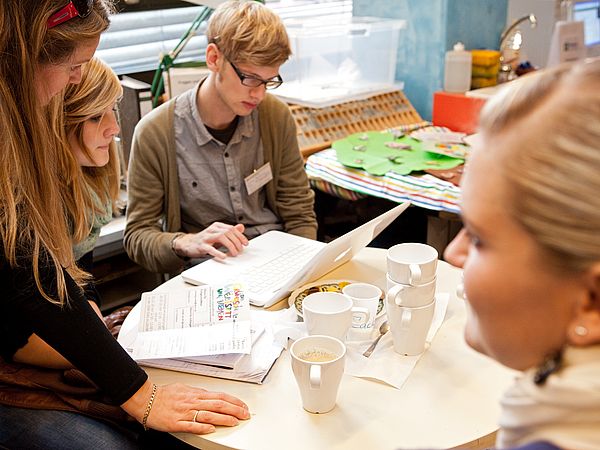Advisory Services at the University of Bremen
The University of Bremen can advise and support you in all matters. You can find contact points for differing issues here. For example, said contact points offer support with study orientation and decision-making, advice on all aspects of studying, help with personal problems, answers to questions on studying with children, and much more.
Contact
Central Student Advisory Service
Advise without appointment:
Mon, Thu 10 a.m. to 1 p.m.
Advise with appointment:
Tue 2 to 4 p.m.: Zoom or face-to-face
Additional appointments
Visiting address:
VWG Building (Central Administration)
Brief information by phone:
Tue, Wed, Fri 3 to 5 p.m.
+49 (0)421 218-61160
zsbprotect me ?!uni-bremenprotect me ?!.de
Advice for Study-Related Decisions
The Central Student Advisory Service is the first point of contact for gathering information on studying at the University of Bremen. The service can advise you with regard to all relevant matters, such as applications and admission, the content of study programs, study requirements, as well as hanging your degree or university.
In-depth subject-specific questions can be clarified by the Academic Advisory Offices in each faculty or by the subject-specific advisory services. For questions about career orientation and starting your career, you should contact the experts in the Career Orientation Offices. Details of who to contact can be found here.

Funding Issues
Studying is expensive and needs to be financed. If you have any questions regarding the financing of your studies, you can contact the Social Counseling Services of the Bremen Student Services Organization. Concerning benefits according to the Federal Training Assistance Act BAföG, you need to contact the Student Services Organization. If there are any problems you can take advantage of the Bafög and social counseling services at the AStA Students' Union (in German). Scholarships can also be used to (co-) finance your studies. The University of Bremen annually awards "Deutschland" scholarships.
We have put together more information about student financing and jobs for you here.

International Students
The work of the university’s International Office revolves around matters that concern international students. The multilingual advisors in the International Office can provide information concerning your options, perspectives, and individual procedures. In this way, we can ensure that you get off to a good start when taking up your studies. Additionally, the kompass program for international students brings foreign and German students together, building a bridge to the University of Bremen.
Studying as a Parent
You don’t have to face this challenge alone. In the summer of 2007, the University of Bremen was accredited by “audit familiengerechte hochschule” (audit family-friendly university). Childcare and nappy changing and play facilities on campus are projects that have since been realized. The family portal of the University of Bremen can help you to find the right contact persons.
Studying with a Disability
The University takes care of the needs of students with disabilities or chronic illnesses. You will find help and support at the KIS Office for Students with Disabilities or Chronic illness and the Psychological Counselling Centre (PBS).
Tips on Making Study-Related Decisions

Step 1: Knowing What You Want
What skills and interests do I have? What do I like doing at school, in my spare time, or in my job? Do I want to study at university or start a course of vocational training instead? And what would be best for me – studying at a university or rather at a university of applied sciences? What knowledge would I like to deepen during my studies and what do I expect from my degree? Self-tests can give you hints, but the decision is still up to you.
Note down answers to these questions in keywords. Of course, you can also visit the Central Student Advisory Service to talk about things.

Step 2: Finding Information
Look for the subjects that suit your interests and future intentions. Find out as much as possible about your intended degree program. Try to figure out what studying certain subjects requires of you and whether you feel up to these requirements. Advisory services such as the central student advisors at universities, subject advisors, student advisors such as the student body, career information centers, and career advisors at employment offices can help you in your decision-making process. You should also make use of written sources of information, such as information leaflets on study programs, course catalogs, and the green book “Studien und Berufswahl” [Studies and Career Choice] available from the of the Job Center.

Step 3: First, see what studying and your chosen career field are like
Nothing beats trying something out first. Make use of information days and trial offers. Most universities allow students to attend courses in the current semester without the need for formal registration. The Central Student Advisory Service will be happy to help you plan and prepare a self-organized trial experience.
Also try to get in contact with students. Who else is able to tell you better what to expect? And if you are interested in certain occupational fields that require a university degree, you should explore such professions as early as possible via an internship. This will help you to check your motivation and estimate whether you can imagine doing the job in future. A brief spell in a company or organization active in the field or talks with people already working in the sector, can be enlightening.

Step 4: Make a decision & apply
If you are uncertain about what to study, think about what is still needed to come to a decision. Problems in the choice of studies can also be discussed in the consultation hours of the Central Student Advisory Service. Once you have made up your mind, the all-important step follows: The application! From the beginning of May, you can obtain the required documentation; and see if you can apply online. Information on applications can be found on the Internet. The brochure “Studying at the University of Bremen” contains all the important information about studying at the University of Bremen as well as details of how to apply. It will be available in printed form from the beginning of May in the Bremen schools, at the Agentur für Arbeit [labor exchange], and in the administration building (VWG) of the University of Bremen. Many courses have subject-specific enrollment requirements (language certificates, internships etc.), which you should inform yourself about in good time. Application deadline for most undergraduate courses at the University of Bremen is July 15 of every year.

5th step: Take up studies
Incidentally, once you have obtained a place at the University of Bremen, you can prepare for your studies even before the official start. And it’s always helpful to improve your foreign language skills, because English literature is commonplace in every study program! The University also offers options for improving your math or EDP knowledge.
The orientation week and Uni-start events take place before the instruction begins in October and will help you get off to a smooth start. There are non-subject-specific events, guided tours, introductory courses, details of study programs, and lots of opportunities to meet your future fellow students. Good luck and a good start into the new territory of university studies!
